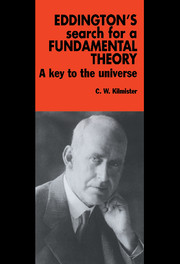4 - Consequences of general relativity
Published online by Cambridge University Press: 03 December 2009
Summary
As well as changes in his life, general relativity brought deep intellectual consequences for Eddington. In this chapter I make a significant step towards understanding the Eddington mystery by tracing the results of his immersion in the elegant theoretical construct of general relativity and his successful confirmation of its predictions. This chapter and the next are two complementary philosophical discussions. The first of these sets out eight features of Eddington's later thought, some acknowledged by him, some only implicit. The second deals at some length with his one major error about general relativity, his assumption of the universal character of tensors. This second argument has a slightly technical aspect, which I have reduced as much as possible. What remains is vital in understanding why Eddington made a mistake the revelation of which in 1928 had such a profound psychological effect on him.
Matter as a construction
With the eclipse expedition behind him Eddington began to publish the many thoughts that his experience in general relativity had produced. It was an amazing explosion of intellectual effort. Some of these publications were explanations of the theory in a more or less technical manner but he also began to write on the philosophical consequences he saw flowing from it. It is dangerous to take Eddington's philosophical writings at face value. When he isolates certain ideas as the important ones for understanding physics it is often because he takes for granted others which are, in fact, more idiosyncratic and more in need of exposition.
- Type
- Chapter
- Information
- Eddington's Search for a Fundamental TheoryA Key to the Universe, pp. 42 - 64Publisher: Cambridge University PressPrint publication year: 1995



